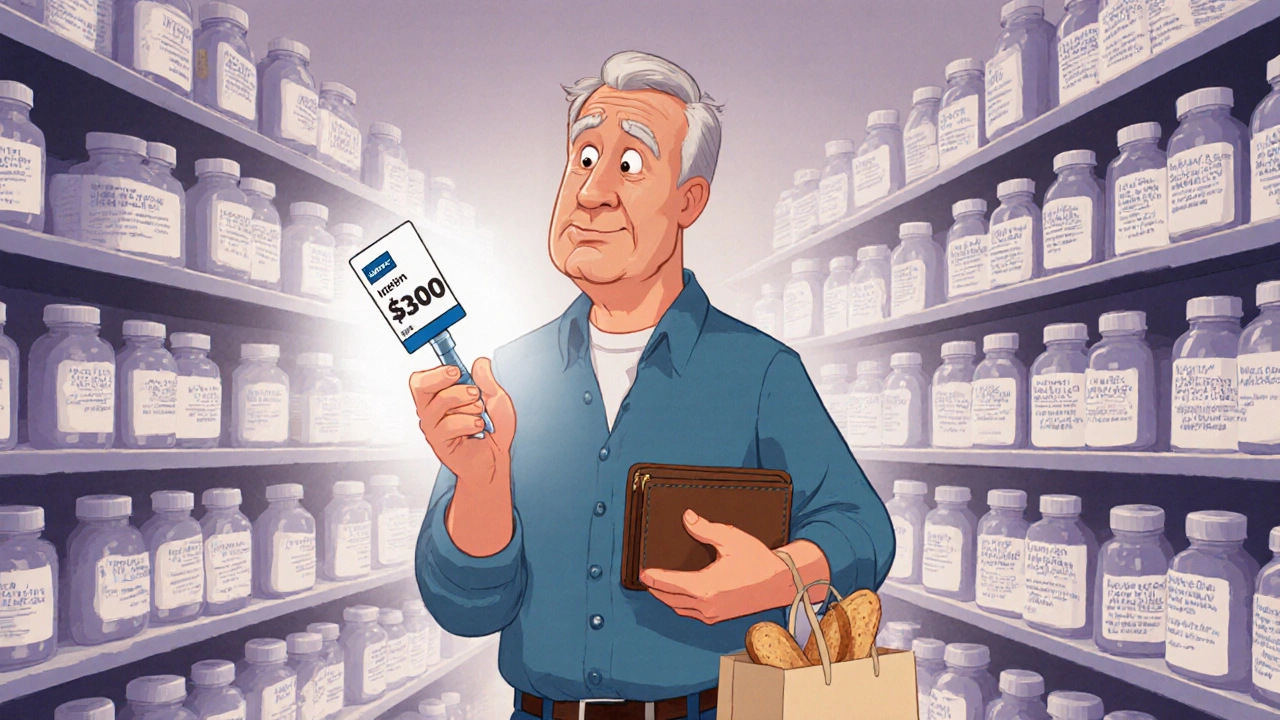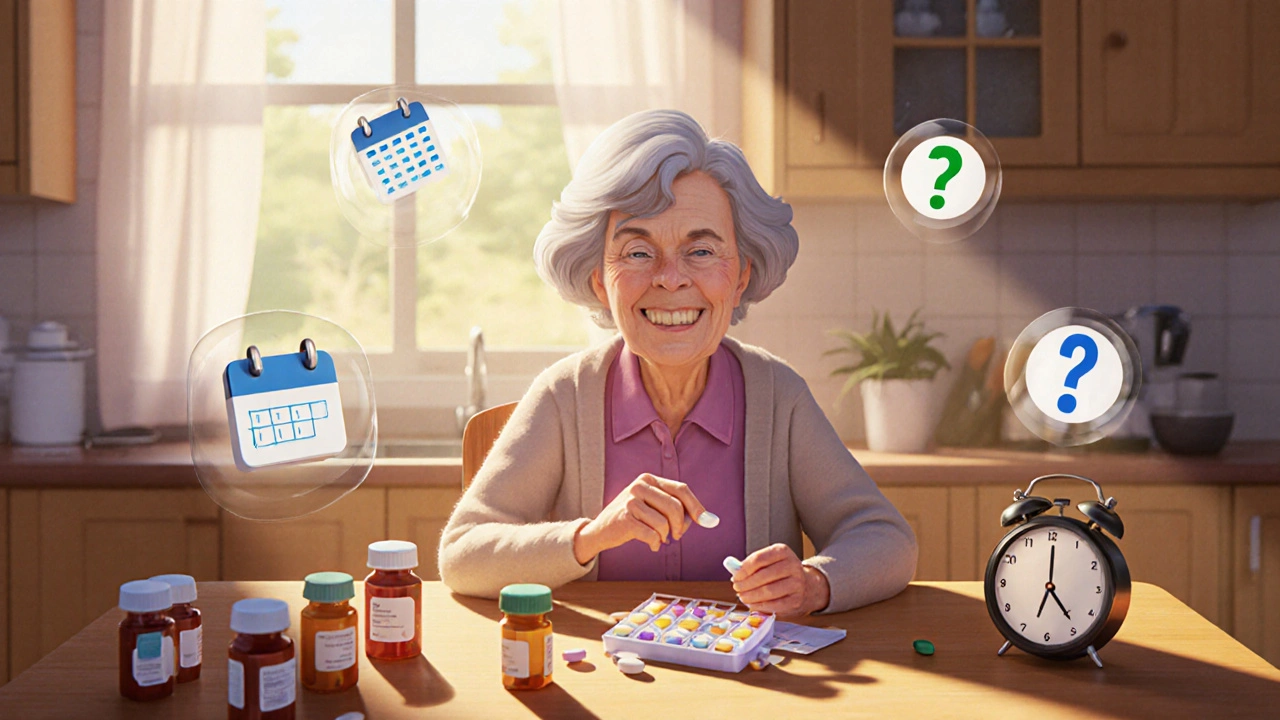Half of all people taking medication for a chronic condition don’t take it as prescribed. That’s not laziness. It’s not ignorance. It’s a complex mix of everyday problems, hidden fears, and system failures that add up until skipping a pill feels like the only option. If you’ve ever missed a dose because you were too tired to figure out your pillbox, or skipped refills because the co-pay was more than your grocery bill, you’re not alone. And you’re not failing - the system is.
Forgetfulness Is the #1 Reason
The most common reason people skip meds? They simply forget. It’s not a character flaw. It’s human. A 2024 study found that 44% of diabetic patients over 59 cited forgetfulness as their biggest barrier. Think about it: if you’re juggling five different medications, each with its own schedule - morning, noon, night, with food, without food - it’s easy to lose track. One pill missed becomes two, then three. Before you know it, you’re weeks behind. And if your doctor didn’t explain why timing matters - like taking blood pressure meds at bedtime instead of morning - you might switch it up on your own, making things worse.Too Many Pills, Too Often
Polypharmacy - taking four or more medications - is a silent adherence killer. For every extra pill you add to your routine, your chance of skipping one goes up by 16%. And it’s not just the number - it’s the frequency. A meta-analysis of 74 studies showed that people taking meds once a day had a 79% adherence rate. Those taking meds four times a day? Only 51%. That’s a massive drop. Imagine needing to remember to take insulin, blood pressure pills, a cholesterol drug, and a diabetes pill - each at different times, with different rules. It’s overwhelming. Many patients end up combining pills in ways they think make sense, not realizing they’re risking side effects or reduced effectiveness.Cost Is a Hard Stop
Money isn’t just a factor - it’s a dealbreaker. Half of all patients say cost is their primary barrier to sticking with meds. The CDC reports that 20% to 30% of new prescriptions are never filled because of price. A single insulin pen can cost $300 out-of-pocket. For someone on a fixed income, that’s a choice between medicine and food. Even if you have insurance, high deductibles and copays add up. One patient on Reddit said, “I refill my blood pressure med every other month because I can’t afford it every month.” That’s not noncompliance - that’s survival.
Confusing Instructions and Bad Packaging
Medication labels are often written for pharmacists, not patients. Tiny print. Medical jargon. Symbols that mean nothing. A diabetic patient shared on Drugs.com that she overdosed twice because she couldn’t read the dosage markings on her insulin pen. Older adults, people with low vision, or those with low health literacy struggle daily. If you don’t understand why you’re taking a drug or how to use it, you’re less likely to take it. And if the bottle won’t open without scissors or the blister pack is too small to read, you’ll skip it - not because you don’t care, but because it’s too hard.Doubts About Need and Fear of Side Effects
Some people skip meds because they don’t believe they need them. This isn’t denial - it’s logic. If you feel fine, why take a pill every day? A 2013 study found that 47% of nonadherence stems from doubts about treatment necessity. And 38% comes from fear of side effects. Someone on statins might stop because they heard it causes muscle pain. Someone on antidepressants might quit because they think it’ll make them numb. These fears are real, even if they’re exaggerated. And if your doctor didn’t take time to explain the risk-benefit balance - like how a 10% chance of mild nausea is far less dangerous than a stroke - you’re left guessing.Communication Gaps with Providers
Most patients don’t get enough time with their doctors. The average primary care visit lasts 15 to 20 minutes. In that time, you’re expected to explain symptoms, get a diagnosis, and understand a new treatment plan - often with complex instructions. No wonder 55% of nonadherence is tied to inadequate counseling. One patient on HealthUnlocked said, “My doctor never told me why I had to take this pill at night. I took it in the morning, and my numbers got worse.” That’s not the patient’s fault. It’s a breakdown in communication. When patients don’t understand the “why,” they don’t stick with the “what.”Life Gets in the Way
Work schedules, caregiving, transportation, housing instability - these aren’t “lifestyle choices.” They’re real-life barriers. A shift worker who changes shifts every few days can’t keep a fixed pill schedule. A single parent juggling two jobs and a sick kid might not have time to refill prescriptions. People in rural areas might live hours from a pharmacy. One Reddit user wrote, “I miss doses because my work schedule changes constantly. I’m never home at the same time.” If your life doesn’t fit the medication schedule, you’ll break the schedule - not because you’re irresponsible, but because the system doesn’t adapt to you.What Actually Helps
The good news? Solutions exist - and they’re simpler than you think. First, simplify. Ask your doctor if you can switch to once-daily meds or combination pills. Second, use automation. Mail-order pharmacies that deliver 90-day supplies improve adherence by 15-20%. Third, get help from your pharmacist. Medication synchronization - lining up all your refills to the same day each month - boosts adherence by 18%. Fourth, use tools. Pill organizers, phone alarms, or even a simple checklist taped to the fridge can work wonders. Fifth, talk. If you’re scared of side effects or think a drug isn’t working, tell your provider. They can adjust it.It’s Not About Willpower
Medication adherence isn’t about being good or bad, responsible or lazy. It’s about design. If the system is too complex, too expensive, or too confusing, people will fail - not because they don’t care, but because they’re set up to fail. The goal isn’t to shame patients. It’s to fix the system. Doctors, pharmacists, insurers, and drugmakers all have roles to play. But the first step is recognizing that skipping a pill is rarely a choice - it’s a response to a broken environment.Why do people skip their medications even when they know it’s important?
People skip meds not because they’re careless, but because real-life barriers pile up: cost, complex schedules, forgetfulness, confusing instructions, or fear of side effects. When taking a pill feels harder than not taking it, skipping becomes the default - even if they know it’s risky.
Is forgetting to take meds a sign of dementia?
Not necessarily. While cognitive decline can make adherence harder, forgetfulness is common even in healthy adults. A 2024 study showed 44% of diabetic patients over 59 forgot doses - and most had no cognitive impairment. Busy lives, multiple meds, and poor labeling are bigger culprits than memory loss.
Can a pharmacist help me take my meds correctly?
Yes. Pharmacists can simplify your regimen, sync your refills to one day a month, provide easy-to-read labels, and answer questions about side effects. Many offer free adherence counseling. Ask them to review all your meds - even over-the-counter ones - to spot interactions or redundancies.
What if I can’t afford my medication?
Talk to your doctor or pharmacist. Many drugmakers offer patient assistance programs. Generic versions often cost a fraction. Some pharmacies have $4 generic lists. You can also ask about 90-day mail-order refills - they’re often cheaper than monthly pharmacy visits. Never stop a med because of cost - ask for help first.
Do medication reminder apps really work?
For some, yes. Studies show apps improve adherence by 10-25% when used consistently. But they’re not magic. Older adults or those with low digital literacy often struggle. A simple pill organizer or alarm on your phone works just as well. The key isn’t the tool - it’s consistency and simplicity.
How can I tell if I’m not taking my meds as prescribed?
Look for signs: running out of pills too soon, skipping doses because you’re “feeling fine,” or avoiding refills due to cost or confusion. Your doctor can also check your Medication Possession Ratio (MPR) - if it’s below 0.80, you’re likely missing doses. Be honest with your provider - they’ve heard it all before.
Are there new treatments that make adherence easier?
Yes. In 2022, the FDA approved seven new long-acting formulations - like monthly injections for high blood pressure or schizophrenia - that cut dosing from daily to once a month. These can raise adherence from 45% to 85%. Combination pills (like a single tablet with three drugs) are also becoming more common. Ask your doctor if any of these options work for your condition.


